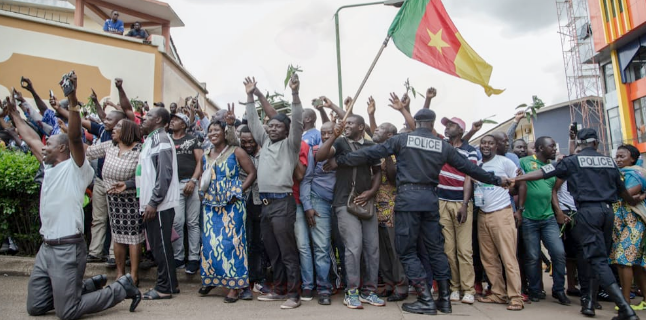Photos: Crisis Group
Cameroon’s authorities should ensure accountability for their security forces’ crackdown on opposition leaders, supporters and peaceful protesters in September 2020, Amnesty International and Human Rights Watch said today.
They should immediately and unconditionally release all those held for expressing their political views or for exercising their right to peaceful assembly and end the campaign of repression against peaceful protesters and critics.
“Last September, Cameroonians courageously challenged their government over their crackdown on peaceful dissent, and they were met with violence and contempt,” said Ilaria Allegrozzi, senior Africa researcher at Human Rights Watch. “One year on, the repression continues, with more protests banned and peaceful protesters still behind bars.”
On September 22, 2020 security forces fired teargas and water cannons to disperse peaceful protests across Cameroon. They arrested over 500 people, mainly opposition party members and supporters. The authorities beat many people during those arrests and in custody.
These protests had been organized following calls by the opposition party, Cameroon Renaissance Movement (Mouvement pour la renaissance du Cameroun – MRC), other opposition parties, and civil society organizations to take to the streets over the government’s decision to organize regional elections.
Opposition parties had expressed concerns that the elections could not be conducted freely and fairly without reforming the electoral code and addressing the lack of security in the Anglophone regions.
Maurice Kamto, the MRC leader, was arrested in January 2019 after countrywide peaceful protests and released following a presidential decree in October 2019. He was rearrested on September 20, 2020 and was held under de facto house arrest until December 8, with heavy security apparatus outside his residence. The authorities never charged Kamto or provided an explanation for his house arrest.
According to a committee of MRC lawyers, at least 124 MRC members and supporters, including the prominent leaders Olivier Bibou Nissack and Alain Fogue Tedom remain in arbitrary detention, in Yaoundé, Cameroon’s capital; Douala, in Littoral region; Bafoussam, in West region; and Mfou, in Centre region.
In all, 116 face trial before military courts, on charges stemming from their participation in protests or for their activism. Eight have been convicted before a civilian court on similar charges and are serving two-year prison sentences.
On August 3, the prosecutor of the Yaoundé military court dismissed a complaint filed by Alain Fogue Tedom’s lawyers on January 13 alleging that he was tortured in detention between September 22 and November 3, 2020 at the State Defense Secretariat (Secrétariat d’Etat à la défense, SED), a detention facility in Yaoundé. Human Rights Watch has documented routine use of torture at the SED facility.
“It has become abundantly clear that civilians cannot get a fair trial before military courts, which lack independence,” a Cameroonian human rights lawyer, Michelle Ndoki, told Human Rights Watch.“The use of military courts to try civilians violates international law, and Cameroon should once and for all reverse this troubling trend.”
In a statement on September 9, 2, the committee of MRC lawyers declared that it decided “to withdraw from the ongoing legal proceedings,” as “it cannot associate itself with arbitrariness and illegality.”
In a separate statement, issued the same day, the 124 detainees, calling themselves “Paul Biya’s political hostages,” referring to the country’s president, said they would no longer appear before Cameroonian jurisdictions because they do not want to support “a parody of justice.”
In a separate incident, on September 18, 2020, gendarmes arrested four members of the civil society platform Stand Up for Cameroon who had attended a meeting at the headquarters of the opposition Cameroon People’s Party in Douala.
A year later they remain arbitrarily detained at Douala New Bell prison, facing trial before a military court, on charges of attempted conspiracy, revolution and insurrection. On September 15, the Douala military court adjourned the trial for the sixth time, until October 13.
The Cameroonian authorities have not opened an investigation into the violations by security forces and other government personnel during the September 2020 crackdown, and no one has been held accountable. Indeed, government repression of opposition and dissent continues. Authorities prohibited an MRC demonstration planned for July 25 in Yaoundé, citing concerns around Covid-19 and general public order. On the same day, however, a demonstration by supporters of the ruling party took place in Bertoua, Eastern region.
On August 9, gendarmes arbitrarily arrested the prominent tech entrepreneur and vocal critic of President Biya, Rebecca Enonchong, in Douala. She was detained for “contempt of a magistrate,” until August 13, then was released and all charges against her were dropped. She had previously supported human rights campaigns and denounced violations by government forces.
The European Union noted that “civil and political rights continue to be subject to limitations” in Cameroon, in a statement to the Human Rights Council on September14.
“One year after violently quashing peaceful demonstrations, Cameroonian authorities are still resorting to their old repressive tactics,” said Fabien Offner, Amnesty International’s Central Africa researcher.
“The African Union, the African Commission on Human and Peoples’ Rights, the Economic Community of Central African States, and Cameroon’s other regional and international partners should press the government to ensure accountability for security forces’ violations and demand the immediate and unconditional release of all those arbitrarily detained and the respect of free speech and peaceful assembly.”







